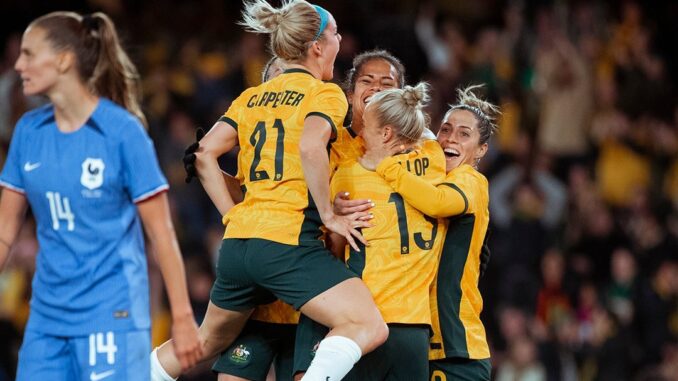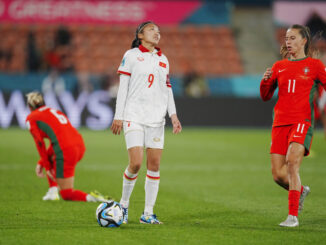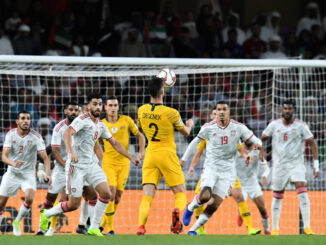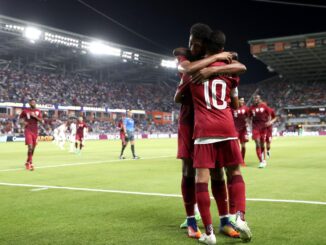

This is the moment Australia has waited 1120 days for.
From the moment Gianni Infantino declared Australia and New Zealand would host the 2023 FIFA Women’s World Cup, every aspect of Australian football has been focused on this moment.
It’s been an at times turbulent ride. When is it ever not in Australian football?
Four months after the announcement unheralded Swede Tony Gustavsson was announced as the man to lead Australia to their first ever World Cup on home soil, a heavy crown for any individual to wear.
The journey from then until now has been far from plain sailing.
Identifying a need to compete more regularly against the world’s best, which in the women’s game increasingly came from Europe, Gustavsson exposed the Matildas to a heavy schedule of matches against these nations – and in doing so the Matildas were exposed.
In April 2021 there were 5-2 and 5-0 losses to Germany and the Netherlands respectively, which raised more than a few eyebrows as to the direction the team was headed.
Concerns over that direction really intensified after what can only be described as a disappointing AFC Women’s Asian Cup in January at the start of 2022.
Understandably, Australia entered the tournament as one of the favourites and made light work of the group stage; winning all three games, scoring 24 goals and conceding just one.
A quarter-final against South Korea was seen as a tricky assignment, but one that Gustavsson’s side was capable of navigating.
A 1-0 loss to the Taegeuk Ladies wasn’t in anyone’s script. It was the Matildas’ worst result at the Women’s Asian Cup since Australia joined the Asian Football Confederation in 2006.
“I take full ownership for performances, so do the players but we also know that football can be this way sometimes,” Gustavsson said in the aftermath.
“I can throw up a lot of stats here with everything from shots, and final third entries and all those things. But at the end of the day, games in tournaments are won and lost inside the 18 and Korea won that game today. And that’s why we lost the game.”
The criticism was fierce, with leading analyst Andy Harper declaring the result a “disaster” and a “failure”.
“(Gustavvson) backed himself into a corner, in my opinion, with this team and going to this tournament with a full-strength squad (as) the best in Asia, and he needed to win it.
“Twenty games now under Tony Gustavsson, and I want someone to plot me the growth trajectory on this team. I want someone to do it.
“He, and his coaches, and the high performance staff, have to be able to plot after 20 games a trajectory of improvement, and I can’t see it – but I’m willing, oh so willing, to be educated.”
There was still worse to come
Spain put seven past an under-strength Matildas, which was followed up by back-to-back losses against Olympic champions Canada on home soil.
The noise around his future was deafening. So close to a World Cup on home soil, it was an alarming form line that no doubt would’ve had those at Football Australia worried. This was meant to be their crowning moment, but rather than climbing the mountain the Matildas were headed for the cliff.
But, call it good planning or good luck, Gustavsson has turned things around.
Those Gustavsson exposed to international football are now no longer floundering, but flourishing, and there’s now an undeniable depth to the squad that was named to represent Australia at this World Cup.
Names like Sam Kerr, Caitlin Foord and Ellie Carpenter may be the headline acts, but just as important are the likes of Clare Hunt, Kyra Cooney-Cross and Cortnee Vine, all players Gustavsson has given an opportunity to during his tenure.
Since back-to-back losses, on home soil no less, to Canada in September of last year, Australia has won nine of their last ten matches, including headline wins over European champions, England, France, Spain and Sweden.
That’s four teams inside the world’s top six.
It’s that form line that has everyone in Australia dreaming again.
THE COACH – TONY GUSTAVSSON
Appointed in September 2020, just as the global pandemic was starting to bite, the affable Swede has certainly faced his share of challenges.
Preparing any team for a World Cup is difficult, but having to navigate a once-in-a-lifetime pandemic in the middle of that threw up more hurdles than ordinarily would’ve been the case.
While he may not have had the profile of other names reportedly on Football Australia’s hit list, his time spent as an assistant with the US women’s national team under Jill Ellis was an alluring selling point.
Getting some of that US magic dust? Yes, please.
“One of the key reasons I’m here is that I believe a lot in this playing group,” Gustavsson said.
“There’s a lot of potential here, they have shown their qualities, but I also think that together I can take them to the next level.”
Embed from Getty ImagesAffable, friendly, but slightly quirky, the 49-year-old has struck up an incredible rapport with his players. While it’s rare for players to openly question their coach in any circumstance, even at the deepest depths of their struggles, the Matildas never lost face.
The way they spoke of their belief in Gustavsson seemed like more than just a token gesture of support. It seemed genuine. They had never lost hope in him and he never lost hope in them.
“This is a special group of players who, when you see the anticipation around the tournament and level of interest for women’s football, have already sparked a transformation,” Gustavsson said. “We can’t wait to get the tournament underway in front of a record crowd of support.”
PLAYERS TO WATCH
Sam Kerr
What else is there to say about the Chelsea superstar?
If there were any doubts about her status as a truly elite player when she headed to south London, they have more than been answered.
Her trophy cabinet is littered with individual and club awards, and her reputation as one of the world’s best and most lethal strikers is firmly entrenched. She is the face of this team in more ways than one. A captain, and a leader, she carries the weight of a nation not seen since Cathy Freeman coming into this tournament.
Not that you’d know it from her demeanor. If there is any stress or nerves, she isn’t showing it.
“Any time you go to a World Cup whether its your first or your third or fourth, it’s an amazing feeling,” she said recently.
“It’s something you can never take for granted and I never will. But to do it on home soil is a once on a lifetime opportunity for not many people so I’m very very honoured.
“Every time I talk about it I get emotional because I can’t believe…we’re hosting a Women’s World Cup. When I started playing for the Matildas I would never have dreamt of this. I’m very excited and just want to get started.
Caitlin Foord
From the other side of London to her strike partner, the Arsenal forward has been in sensational form for club and country in the past 12 months.
A former AFC Women’s Player of the Year, she battled injury towards the end of the Women’s Super League season but is now fully recovered and ready to light up this Women’s World Cup.
With Kerr the focal point of the attack, Foord had often but pushed out wide, but Gustavsson’s move to bring her in just behind Kerr has been the catalyst for their turnaround in form.
“I like to get the ball at my feet and dribble and stuff like that. And Sam’s first run would probably be to run in behind and get the ball like that,” Foord said.
“We do work really well off each other, and it does come naturally. I guess it helps when you’ve played many years together and grown up together and adapted our game together, in a way. There’s just excitement as well, when we play together.
“I think that’s why it just works – if I come, she’ll go. And obviously, the option is there to do the opposite. But, naturally, our first instinct is opposites anyway, so it creates two options.”
Ellie Carpenter
It’s scary to believe, given all that she has achieved, that Ellie Carpenter is still 23 years of age.
The dashing full back debuted for the Matildas aged just 15 and her tender age saw her break the record for the youngest ever player at both the Olympics and NWSL.
An anterior cruciate ligament injury sustained in the final of the 2022 UEFA Women’s Champions League Final, which her Lyon side won 3-1 against Barcelona, threatened to derail her World Cup dream.
But such is her determination she returned to action in March, well ahead of schedule, and she will attack this World Cup – and attack is the right word when it comes to Carpenter – in peak fitness.
“Honestly, I think it was the best thing that’s happened to me,” she said earlier this year.
“I really needed this break. I was really fatigued; I’ve played a lot – a lot – of football in the last year-and-a-half. I was just on the verge of being burnt-out, really.
“The injury came and obviously it was disappointing, but at the same time, it was the perfect time for me to reset, get stronger, have a rest, have an off-season that I never really have had.
“I think I really, really needed it and I think I’m better from it. I’m more refreshed. I feel better on the pitch than ever before. As much as I never want a long-term injury, I think it was a blessing in disguise.”
Listen to The Asian Game Podcast as we preview Australia’s chances at the FIFA Women’s World Cup 2023




